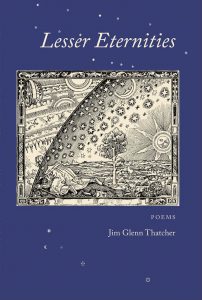Praise for Lesser Eternities from the back cover
Thatcher’s mystical, yet earthy poems are among the most moving I’ve encountered. Jim has an understated way of telling stories in poems that reveal profound insights into nature and the wonder of the cosmos. While remaining rooted in human experiences diverse as driving a car on a wintry night (Consciousness), renovating doors the colors of sky (Sanding Blue Doors), or dying alone and unlamented amid a forest of woods, yes, and words (Understory). His striving for excellence rings in every line, as does his interest in folks rural and cosmopolitan alike. One of my favorite poets, he writes honestly, organically, and lovingly about them all, often with a darkly lyrical touch I find irresistible.
—Don Williams, writer, founder and editor emeritus of New Millennium Writings
Jim is the high priest of cosmic embrace. He’s a man singing to winter stars. His language takes us through endless space, and then points out the microbes and dust mites within it. These poems are litanies that celebrate the sacred in leaf, lichen and lightyear, in lone spark and eon. Thatcher does not deny the darkness, but looks through it to find awe. And awe is one of the greatest gifts poetry has for us.
—Betsy Sholl—Former Poet Laureate of Maine; faculty University of Southern Maine and Vermont College of Fine Arts
The poems in Lesser Eternities exude not only the senses of time and nature but also those of reason. I first read him two years ago & instantly waved myself in as an admirer. His poems have broadband vision and sympathies, a maddening facility with language, and a verse technique for seeing and reporting the world as it is. Jim has an irony that has outgrown egotism. A willingness to confront the tragedies of history without casting oneself (or anyone else) into a permanent tragic role. He has a gift for making the moment full and honoring its ancestry. Standing at the door to welcome surprise, He is open to the presence of all. Thatcher is incredibly well read, drawing frequently upon the Scholastics, Greek myth, classics of China and Japan (Li Po, Basho)—and humor, (Abandoned Ode to an ’82 Toyota)—and the playful in (Ampersand). He knows meaning is never fixed, that it needs to be constantly replayed in a different key. There’s no sufficient way of praising these poems. They want to be dog-eared and underlined. The reader’s own awareness comes acutely alive for having read them— “For there is no return, only change;/ the continuous transformation of origin/ outward into every-ness”//and from there “given life by the stars,/ risen from the dust of this now strange planet/ into a species with an unknowable destiny,/ gifted with intelligence but hindered by its weaknesses.” Thatcher brilliantly articulates the comi-tragedy of our human situation, from which meaning must be constantly won. We hold up what we know with what we still do not know.
—Ted Bookey author of Mixty Motions
